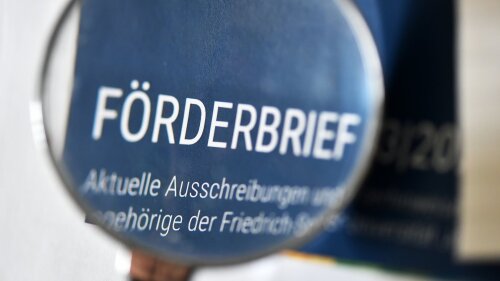
Individual funding programmes
The DFG's Individual Research Grants
The Individual Research GrantsExternal link enable individuals who have completed their academic training to conduct at any time research projects with clearly defined topics and durations, regardless of the subject. The funding period is initially limited to a maximum of three years. After that, researchers can apply for a continuation of the funding. (Source: DFG)
For advice, please contact the Service Centre for Research and Transfer.
Click here for more information on how to apply.
Are you already being funded? Click here for more information on how to carry out your externally funded project.
The DFG's Individual Research Grant with the Module 'Temporary Positions for Principal Investigators'
By applying for the module ‘Temporary Positions for Principal InvestigatorsExternal link’, researchers can obtain funds to finance their position as project leader for the duration of their project. The module enables researchers from Germany and abroad to focus exclusively on the proposed scientific project at a German research institution. (Source: DFG).
If you are looking for advice on the programme, please contact the Service Centre for Research and Transfer.
Click here for more information on how to apply.
Are you already being funded? Click here for more information on how to carry out your externally funded project.
The European Research Council (ERC) grants
ERC Consolidator GrantsExternal link are aimed at excellent researchers (7-12 years after their doctorate) who wish to build on their excellent research achievements and establish their own independent research group (up to 3.5 million euros for 5 years). (Source: NCP ERC)
ERC Advanced GrantsExternal link are aimed at excellent, established scientists of any nationality with an outstanding scientific record in the last ten years. The programme is open to all fields of research and researchers can receive a maximum of 2.5 million euros (in exceptional cases up to 1 million euros) for their research topic over a period of up to 5 years.
ERC Synergy GrantsExternal link are aimed at teams of two to four outstanding and promising scientists of any nationality with an excellent scientific track record. Central to the funding is an intrinsic synergy effect of the research project, which is funded over a period of up to 6 years with a maximum of 10 million euros (in exceptional cases additionally one-off funding of up to 4 million euros).
The Service Centre for Research and Transfer will support you in all matters relating to the acquisition of ERC grants and offers various coaching sessions in preparation of an application. Please get in touch as early as possible for comprehensive programme and application advice.
Already being funded? Click here for more information on how to carry out your externally funded project.
The Alexander von Humboldt Foundation's scholarship programmes
The Alexander von Humboldt FoundationExternal link promotes exchange between excellent foreign and German researchers, e.g. with research fellowships, research awards and the prestigious Humboldt Professorship, irrespective of discipline and nationality.
Research Fellowships: Scientists and scholars of all disciplines and nationalities are eligible to apply, provided that they have an academic cooperation partner (host).
Research Awards: Nominations are made by an academic cooperation partner.
For advice, please contact the Welcome Point of the International Office.
Click here for more information on how to apply.
Already being funded? Click here for more information on how to carry out your externally funded projects.
The Volkswagen Foundation's programmes
The Volkswagen FoundationExternal link promotes individual and collaborative research projects in the humanities and natural sciences. The Foundation has a special focus on fostering cooperation between researchers beyond disciplinary and national borders. It focuses its funding on selected funding initiatives. With these initiatives, the Foundation aims to provide effective impulses and establish pioneering topics.
If you are looking for advice on the programmes, please contact the Service Centre for Research and Transfer.
Click here for more information on how to apply.
Are you already being funded? Click here for more information on how to carry out your externally funded project.
DAAD programmes
The DAAD provides scholarships and third-party funding for projects and partnerships with international universities. It offers extensive funding programmes for scientists and university teachers in a variety of target countries.
Please use the websites of the scholarship providers or the DAADExternal link scholarship database for external funding programmes and individual funding.
For advice, please contact the International Office
Click here for more information on how to apply.
Are you already being funded? Click here for more information on how to carry out your externally funded project.
Academic awards and honours
Have you become aware of an award procedure and would like to nominate yourself, your doctoral students, young researchers or colleagues?
If it is an award for which the University leadership holds the right of nomination, please address your questions to the Office of the Vice-President for Research.
Collaborative funding programmes — Coordinated programmes
The DFG's Collaborative Research Centres
Collaborative Research CentresExternal link are long-term research institutions at universities, established for a period of up to twelve years, in which scientists and scholars cooperate within the framework of an interdisciplinary research programme.
They make it possible to work on innovative, demanding, elaborate and long-term research projects by coordinating and pooling people and resources at the applicant universities. In doing so, they contribute to the creation of institutional priorities and structures. Cooperation with non-university research institutions is expressly encouraged. Collaborative Research Centres consist of a multitude of projects, the number and size of which are determined by the research programme. The individual projects are led single scientist or by several scientists working together.
For advice, please contact the Office of the Vice-President for Research.
The DFG's Research Training Groups
Research Training GroupsExternal link are institutions within universities that promote young researchers and are funded by the DFG for a maximum of nine years.
The focus is on the qualification of doctoral candidates in the context of a thematically focused research programme and a structured qualification concept. The research training groups should have an interdisciplinary orientation. The aim is to prepare doctoral candidates intensively for the complex labour market of "science" and at the same time to support their early scientific independence.
For advice, please contact the Office of the Vice-President for Research.
The DFG's Research Units
A Research UnitExternal link is a close working alliance of several outstanding scientists and/or scholars who work together on a research task. The thematic, temporal and financial dimensions of the research project go far beyond the funding possibilities offered in the context of individual funding under the Individual Grants Programme or Priority Programme. The funding of research groups is intended to help provide the necessary personnel and material resources for a close medium-term cooperation of usually eight years. Research Units often contribute to establishing new research directions. As far as quality criteria are concerned, the same principles apply as for Research Grants.
For advice, please contact the Office of the Vice-President for Research.
The preparation of applications in coordinated programmes of the DFG can be supported with positions from the Research Committee's pool of positions de DE.
Federal programmes
The federal ministries support the implementation of research and innovation projects in the context of thematic and open-topic funding programmes. The range of funding is tailored to important fields of innovation or technology, but also to different challenges and starting conditions in our society. Please click hereExternal link for the latest federal announcements.
If you are looking for advice on the programmes, please contact the Service Centre for Research and Transfer.
Click here for more information on how to apply.
Are you already being funded? Click here for more information on how to carry out your externally funded project.
EU programmes (especially Horizon 2020)
The current Framework Programme of the European Union—Horizon EuropeExternal link—provides funding for multidisciplinary research and development projects at the European level in various funding programmes. The core consists of the following three pillarsExternal link: Excellent Science (free space for scientific (basic) research, here in particular Future and Emerging Technologies — FET), Industrial Leadership (strengthening the competitiveness of the economy) and Societal Challenges (addressing societal challenges for the European citizen).
If you are looking for advice on the programmes, please contact the Service Centre for Research and Transfer.
Click here for more information on how to apply.
Are you already being funded? Click here for more information on how to carry out your externally funded project.
Innovative Training Networks (ITN)
The Marie Skłodowska-Curie Innovative Training Networks (ITN)External link offer funding for structured doctoral training networks for up to four years. The aim is to enhance the scientific and general competences of early career researchers within an international, interdisciplinary and intersectoral research and training programme.
If you are looking for advice on the programmes, please contact the Service Centre for Research and Transfer.
Click here for more information on how to apply.
Are you already being funded? Click here for more information on how to carry out your externally funded project.
Programme of the State of Thuringia
The project funding instruments set out in three guidelines and a state programmeExternal linkDE support projects ranging from knowledge-based basic research to marketable implementation in companies.
If you are looking for advice on the programmes, please contact the Service Centre for Research and Transfer.
Click here for more information on how to apply.
Are you already being funded? Click here for more information on how to carry out your externally funded project.
The Carl Zeiss Foundation's programmes
The programmes of the Carl Zeiss FoundationExternal link follow an annual theme. The annual theme for 2021 is ‘Scientific Breakthroughs in Artificial Intelligence’. The number of applications is limited, which is why the University management preselects them.
As part of the 'Breakthroughs — Excellence in ResearchExternal link’ programme, the Carl Zeiss Foundation helps universities to further develop and expand their already proven research strengths.
As part of the ‘Perspectives — Excellence in ResearchExternal link’ programme, the Carl Zeiss Foundation supports universities in developing their potential in promising research fields.
For advice, please contact the Office of the Vice-President for Research.
The Volkswagen Foundation's programmes
The Volkswagen FoundationExternal link promotes individual and collaborative research projects in the humanities and natural sciences. The Foundation has a special focus on fostering cooperation between researchers beyond disciplinary and national borders. It focuses its funding on selected funding initiatives. With these initiatives, the Foundation aims to provide effective impulses and establish pioneering topics.
If you are looking for advice on the programmes, please contact the Service Centre for Research and Transfer.
Click here for more information on how to apply.
Are you already being funded? Click here for more information on how to carry out your externally funded project.
Infrastructure funding
Funding for Major Instrumentation
In accordance with Article 91b of the German Basic Law and as part of the programme ‘Funding for Major Instrumentation’, the DFG provides funds for the proportional (50%) financing of major research instrumentation at universities. The investment projects for university research must be of particular scientific quality and transregional significance. The necessity of their procurement and use must be justified solely by their use in research. The equipment may also be used in teaching and/or clinical care (source: DFG).
For advice, please contact the Office of the Vice-President for Research.
Research buildings
Research buildings are new buildings, conversions or extensions, including large-scale equipment at higher education institutions. The federal states submit proposals for research buildings to the German Council of Science and Humanities (Wissenschaftsrat) for review. The Council makes recommendations to the Joint Science Conference (GWK) on the projects to be carried out. The GWK decides annually, in the context of funding phases, which research building projects are to be implemented (source: DFG).
For advice, please contact the Office of the Vice-President for Research.
The funding databases ResearchConnectExternal link and ELFIExternal link provide information on further funding opportunities. Members of the University of Jena can search both databases free of charge.
